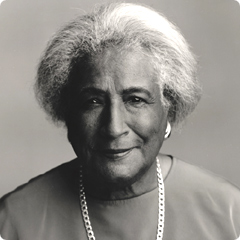In honor of Black History Month, we look back at some of our trailblazing and accomplished black alumni.
Shirley Anita St. Hill Chisholm '51TC

(Photo: Columbia250)
"Unbought and Unbossed."
As a member of the New York State Assembly and then the U.S. Congress, Chisholm gained widespread notice as a tireless advocate for the interests of African Americans, women, and the urban poor, and as a champion of great educational opportunity for all.
Despite her historic "firsts," Chisholm has said she does not want to be remembered primarily for them: "I'd like to be known as a catalyst for change," she said, "a woman who had the determination and a woman who had the perseverance to fight on behalf of the female population and the black population, because I'm a product of both, being black and a woman."
In 1985, Chisholm received a Distinguished Alumni Award from Teachers College.
-------------
Paul Robeson '23LAW

(Photo: Columbia250)
One of the most prominent black Americans of the 1930s and 1940s, Robeson won critical and popular acclaim for his stage and screen roles. It was as a concert singer, however, that he earned his greatest fame, performing a uniquely broad repertoire of spirituals, classical music, world folk songs, and political songs that reflected the struggles of the marginalized and disenfranchised.
-------------
Constance Baker Motley '46LAW

(Photo: Columbia250)
Over fifty-plus years as a jurist, Constance Baker Motley has had a major impact on ending racial discrimination. As the NAACP Legal Defense Fund's associate counsel, she participated in writing the briefs for Brown v. Board of Education of Topeka, Kan., et.al., the landmark 1954 U.S. Supreme Court case that ended school segregation. From October 1961 to the end of 1964, Motley won nine of the 10 civil rights cases she argued before the Court, including James Meredith's successful suit to attend the University of Mississippi. She went on to break down other gender and race barriers as the first African-American woman elected to the New York state senate (1964) and to the Manhattan borough presidency (1965). Appointed to a judgeship for the Southern District of New York in 1966, she became the first African-American woman on the federal bench and, in 1982, the first African-American woman to serve as chief judge. Motley assumed senior judge status in 1986, and in 2001, President Bill Clinton awarded her the Presidential Citizens' Medal in recognition of her achievements and service to the nation.
-------------
Beverly L. Greene '45GSAPP

(Photo: University of Illinois Archives via Columbia)
Greene is believed to have been the first African American woman licensed to practice architecture in the United States. In 1936, she became the first African American woman to receive a bachelor's degree in architectural engineering, from the University of Illinois at Urbana-Champaign.
-------------
Maurice V. Russell '50SW, '64TC

(Photo: Eileen Barroso/Columbia University)
During his more than 40-year career, Russell taught and directed social services at several New York institutions. He is credited with establishing the first professional department of social work at Harlem Hospital. He was a trustee of Columbia from 1987 to 1995.
-------------
Marie Maynard Daly '47GSAS

(Photo: Queens College via Columbia University)
In 1947, Daly became the first African American woman to earn a PhD in chemistry. She investigated the effects of cholesterol, sugars, and other nutrients on the heart. Daly also taught biochemistry at Columbia’s College of Physicians and Surgeons.
-------------
Charles Drew '40PS

(Photo: Columbia University)
Charles R. Drew discovered that plasma could be dried and reconstituted, making it possible to “bank” it for long periods of time. This work led to his development of the world’s first blood bank and improved techniques for blood storage. He also challenged the scientific fallacy of racial segregation in blood donation.
-------------
Barack Obama '83CC

(Photo: Columbia University)
Having won 53% of the popular vote and an overwhelming 68% of the Electoral College, Obama was inaugurated as the nation’s first African American president on January 20, 2009.
---
For these complete bios, visit the Columbia250 site and the Columbia University's Black History Month site.
----
Each year the Columbia Black Alumni Council (BAC) honors an alumnus/a of the University who has made significant contributions both to the University and the larger world, and has demonstrated a consistent dedication to the Black community. Check out highlights from this year's ceremony:
